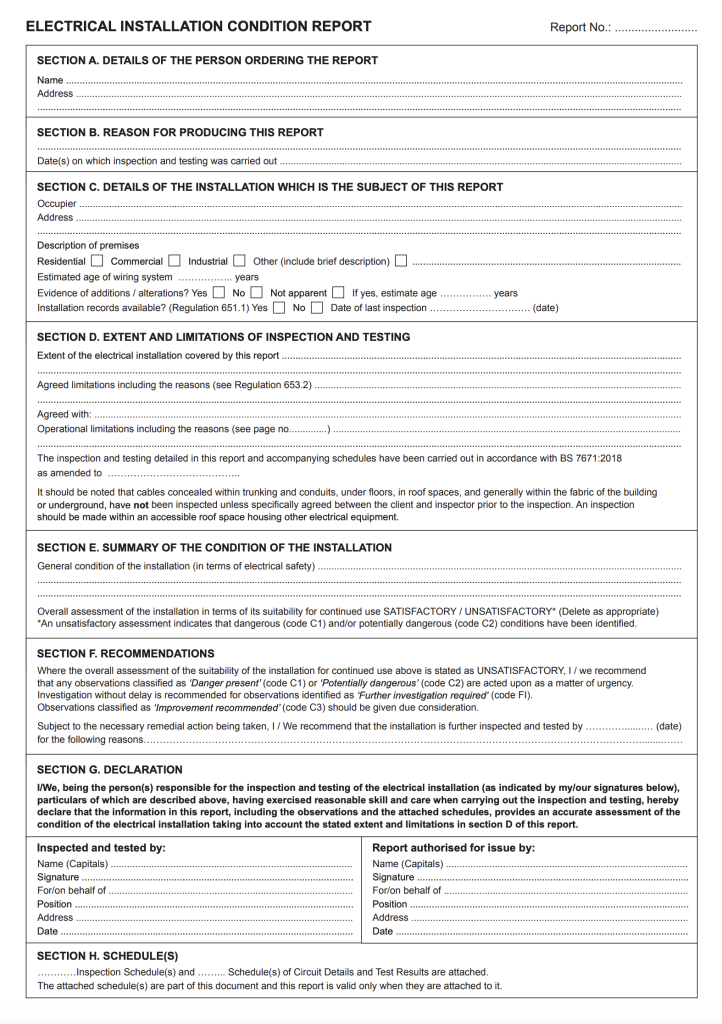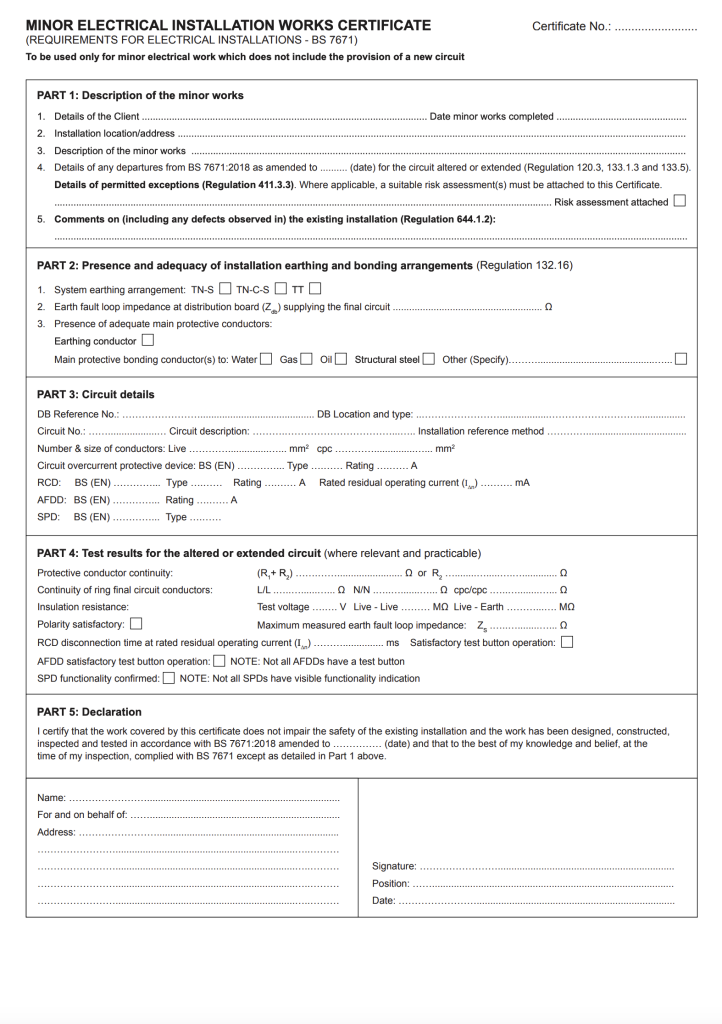
Part P Notifiable or Non-Notifiable
Part P of the Building Regulations
Part P Electrical Work in England: Notifiable vs Non-Notifiable Explained
If you are carrying out electrical work in domestic properties in England, understanding how Part P of the Building Regulations applies to your work is essential. One of the most common areas of confusion for electricians, improvers, and those entering the industry is the difference between notifiable and non-notifiable electrical work, who is allowed to carry it out, and how compliance is demonstrated. Getting this wrong can lead to enforcement action, problems when properties are sold, and difficulties with insurance or future scheme registration.
This guidance is specific to England only. Building Regulations are devolved, meaning the rules in Wales and Scotland are different. Anyone working outside England must ensure they are following the correct national legislation for that country.
What is Part P of the Building Regulations?
Part P is the section of the Building Regulations in England that relates to electrical safety in dwellings. Its purpose is to ensure that electrical installations are designed and installed safely in order to reduce the risk of electric shock, fire, and injury. Part P does not prevent people from carrying out electrical work, but it does require that certain higher-risk work is formally notified to Building Control unless the person carrying out the work is registered with a government-approved competent person scheme.
Notifiable electrical work in England
Notifiable work is electrical work that is considered higher risk and must be reported to Building Control unless it is carried out by an electrician who can self-certify. In England, notifiable electrical work includes:
-
Installing a new electrical circuit in a dwelling or associated outbuilding
-
Replacing or upgrading a consumer unit (fuse board)
-
Electrical work carried out in special locations, including:
-
Bathrooms (within defined zones)
-
Wet rooms
-
Outdoor installations such as garden lighting or external power supplies
-
This type of work must either be notified to the local authority Building Control department before work starts, or it must be carried out by an electrician who is a member of a competent person scheme and able to self-certify compliance.
How notifiable work is signed off
In practice, there are two routes to compliance for notifiable work. The first is submitting a Building Notice to the local authority and having the work inspected and approved by Building Control. The second, and most common route for professional electricians, is to join a government-approved competent person scheme such as NICEIC or NAPIT. Scheme membership allows electricians to notify work directly and issue compliance certificates without involving Building Control on each individual job.
Non-notifiable electrical work
Non-notifiable work generally covers lower-risk electrical tasks that do not involve new circuits, consumer unit replacement, or work in special locations. In England, examples of non-notifiable electrical work include:
-
Extending or altering an existing circuit outside of special locations
-
Adding additional socket outlets or lighting points to an existing ring or radial circuit in general areas such as:
-
Living rooms
-
Bedrooms
-
Hallways
-
Kitchens (outside of special zones)
-
Utility rooms
-
-
Replacing existing accessories or fittings, including:
-
Switches
-
Socket outlets
-
Ceiling roses
-
Light fittings
-
-
Altering lighting arrangements, such as:
-
Changing a single pendant light to multiple spotlights in a non-special location
-
-
Adding a switched fused spur to an existing circuit, for example for:
-
Boilers
-
Extractor fans
-
Alarm systems
-
-
Connecting equipment to an existing supply, including:
-
Garage door motors connected via an existing isolator
-
-
Replacing fixed electrical equipment where existing wiring and protection are reused, such as:
-
Ovens
-
Cookers
-
Electric showers
-
-
Installing or upgrading equipotential bonding, including:
-
Main bonding to gas and water services
-
Supplementary bonding in non-special locations
-
-
Installing extra-low voltage systems, including:
-
Doorbells
-
Intruder alarms
-
Data cabling (CAT5 / CAT6)
-
Audio and visual systems
-
Non-notifiable does not mean unregulated
Even though non-notifiable work does not need to be reported to Building Control, it must still comply fully with the current edition of BS 7671. All electrical work in a dwelling must be properly designed, installed, inspected, and tested to ensure it is safe. The absence of a notification requirement does not reduce the legal responsibility on the person carrying out the work.
Who can carry out non-notifiable electrical work?
All electrical work must be carried out by someone who is competent. Competency is not defined by job title alone. In the electrical industry, it means being able to demonstrate both academic knowledge and practical ability. This includes understanding legal obligations under the Building Regulations, applying the Wiring Regulations correctly, and having sufficient practical skill and experience to carry out the work safely and to an acceptable standard.
Competency is both academic and practical
Competency is often misunderstood as being purely experience-based. In reality, it requires evidence of underpinning knowledge alongside hands-on skills. Electricians are expected to demonstrate that they understand why requirements exist, not just how to carry out tasks. This combination of theory and practice is what clients, scheme assessors, and regulators look for when assessing competence.
A strong starting point for demonstrating knowledge
The City & Guilds 2383-10 – Understanding the Requirements of the Building Regulations for Electrical Installations in Dwellings is an excellent starting point for anyone looking to carry out non-notifiable electrical work in domestic properties. The qualification focuses specifically on Part P and helps learners understand their responsibilities under the Building Regulations in England.
Supporting a career as a domestic electrician
The City & Guilds 2383-10 is not only suitable for those carrying out minor works. It is also a valuable qualification for anyone looking to progress towards a career as a domestic electrician. When combined with practical experience and further electrical qualifications, it supports applications to competent person schemes and helps demonstrate the academic element of competence expected within the industry.
Why Part P compliance matters
Failing to notify notifiable work, or carrying out work without sufficient competence, can have serious consequences. These include difficulties when a property is sold, invalidated insurance policies, and enforcement action by Building Control. Understanding the distinction between notifiable and non-notifiable work, and how competency is demonstrated, is therefore essential for anyone undertaking electrical work in domestic properties in England.
- Electrical Installation Certificate
- Minor Works Certificate
- Electrical Installation Condition Report (EICR)
All these certificates are open source and available on the IETs website. And commonly referred to as the ‘Model Forms’.

18th Edition Wiring Regulations
- Course & exam only £288.00
- Take the exam only £1196.00
- Book the course today for only £144.00

Part P of the Building Regulations
- Course & exam only £264.00
- Take the exam only £186.00
- Book the course today for only £132.00

Inspection & Testing
- Online course only £234.00
- Centre final exams only £660.00
-
Practical training days
available

Health & Safety in Construction
- Course & exam only £174.00
- Quick home exam option
- Green CSCS Labourers Card

ECS H&S Course
- Online course only £174.00
- ECS Health & Safety Exemption
- Get an ECS Labourers Card






